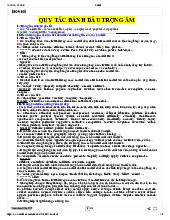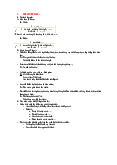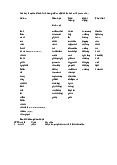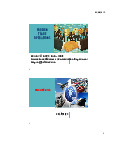

Preview text:
16:34 9/8/24
Present simple - Summary Basic English A. Present simple
1. Form: Subject + Verb + …… 2. Purposes:
Fact, general truth, permanent situation
Earth goes around the Sun Habit, regular occurrence My father smokes a lot;
Buses to York depart on the hour State (*)
This island belongs to my family Declaration
We apologise for any inconvenience
Newspaper headline; live sports commentary;
Fire breaks out in city center; He shoots, he
plot of a film, story; instruction
scores!; In the end, Charlotte marries to
Michael and they live happily forever
Defenite event in the future (timetable,
Our flight takes off at 5p.m; schedule, date)
The law comes into effect on May 1st next year
3. Time expressions: Always, usually, often, sometimes, every day, once a month,….
Note 1: The present simple form of be + adj is used to describe charater. It’s different from the
present continous form be which suggests that somebody is behaving a certain way at one time or about one thing.
Ex: He is selfish. He would never put himself out to help anyone. (Which means he is always selfish).
You are being selfish, Shelly! Let the others have a turn on the computer, too! (Shelly is not
selfish, she’s just behaving selfishly)
Note 2: Stative verbs are verbs that are not normally used in the continuous tense. These verbs relate
to senses, mental state, appearance, possession, emotion and amount. Adore contain envy have mean prefer suit Appeal cost equal hear measure realise suppose Appear depend exist include mind recognise suspect Appreciate deserve expect involve need resemble taste Be desire fear lack notice satisfy trust Belong despise feel like owe see want Concern detest fit look own seem weigh Consider dislike forgive love pity smell wish Consist doubt hate matter possess sound about:blank 1/2 16:34 9/8/24
Present simple - Summary Basic English
Exercise: Complete the sentences by using present simple:
1. Linda (GO) ______ to school by bus.
2. My mother (LIKE) _______ watching Korean romance.
3. The flight to Pleiku city (TAKE OFF) ____________ at 3p.m.
4. Through a process called photosynthesis, trees (PRODUCE) __________ and (RELEASE) ________ oxygen.
5. Michael (PLAY) _______ the piano very well. about:blank 2/2




